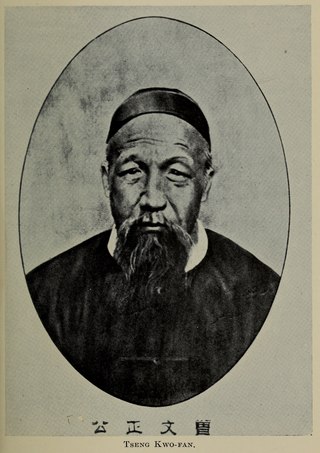
Zeng Guofan, Marquis Yiyong, birth name Zeng Zicheng, courtesy name Bohan (伯涵), was a Chinese statesman and military general of the late Qing dynasty. He is best known for raising and organizing the Xiang Army to aid the Qing military in suppressing the Taiping Rebellion and restoring the stability of the Qing Empire. Along with other prominent figures such as Zuo Zongtang and Li Hongzhang of his time, Zeng set the scene for the Tongzhi Restoration, an attempt to arrest the decline of the Qing dynasty. Zeng was known for his strategic perception, administrative skill and noble personality on Confucian practice, but also for his ruthlessness in repressing rebellions.
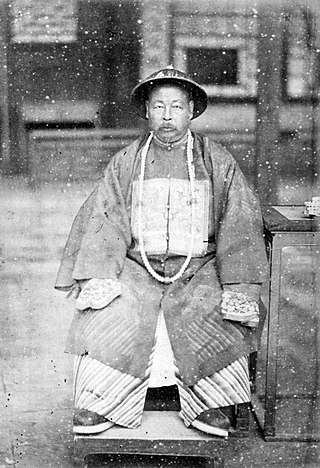
Zuo Zongtang, sometimes referred to as General Tso, was a statesman and military leader of the late Qing dynasty.

Jinshi was the highest and final degree in the imperial examination in Imperial China. The examination was usually taken in the imperial capital in the palace, and was also called the Metropolitan Exam. Recipients are sometimes referred to in English-language sources as Imperial Scholars.

The Dungan Revolt (1862–1877), also known as the Tongzhi Hui Revolt or Hui (Muslim) Minorities War, was a war fought in 19th-century western China, mostly during the reign of the Tongzhi Emperor of the Qing dynasty. The term sometimes includes the Panthay Rebellion in Yunnan, which occurred during the same period. However, this article refers specifically to two waves of uprising by various Chinese Muslims, mostly Hui people, in Shaanxi, Gansu and Ningxia provinces in the first wave, and then in Xinjiang in the second wave, between 1862 and 1877. The uprising was eventually suppressed by Qing forces led by Zuo Zongtang.
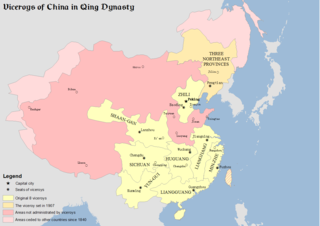
Zongdu were the managers supervising provincial governors in Ming and Qing China. One viceroy usually administered several provinces and was in charge of all affairs of military, food, wages, rivers, and provincial governors within their region of jurisdiction. Viceroys was appointed by and directly reported to the Emperor.

Zhang Zhidong was a Chinese politician who lived during the late Qing dynasty. Along with Zeng Guofan, Li Hongzhang and Zuo Zongtang, Zhang Zhidong was one of the four most famous officials of the late Qing dynasty. Known for advocating controlled reform and modernization of Chinese troops, he served as the governor of Shanxi Province and viceroy of Huguang, Liangguang and Liangjiang, and also as a member of the Grand Council. He took a leading role in the abolition of the Imperial examination system in 1905. The Red Guards destroyed his tomb in 1966 during the Cultural Revolution. His remains were rediscovered in 2007 and reburied.
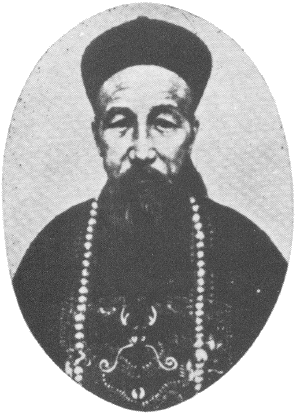
The Xiang Army or Hunan Army was a standing army organized by Zeng Guofan from existing regional and village militia forces called tuanlian to contain the Taiping Rebellion in Qing China. The name is taken from the Hunan region where the Army was raised. The Army was financed through local nobles and gentry, as opposed to through the centralized Manchu-led Qing dynasty. The army was mostly disbanded by Zeng after the re-capture of the Taiping capital at Nanking.

Guanwen, courtesy name Xiufeng, was a Manchu official, Grand Secretariat, military general, Viceroy of Zhili, Huguan and commander of the Army Group Central Plain during the late Qing dynasty in China.

Zeng Guoquan, courtesy name Yuanfu, art name Shuchun, was a Chinese official and military leader of the late Qing dynasty. He was the ninth brother of Zeng Guofan, a prominent statesman and general, and a descendant of the philosopher Zengzi. He served in the Xiang Army, a standing military force organised by his brother to counter the Taiping rebels, and was nicknamed "Ninth Marshal" (九帥). He was known for his expertise in siege warfare, particularly the use of trenches, hence he was also nicknamed "Zeng the Iron Container" (曾鐵桶). During the conquest of Tianjing (Nanjing), the capital of the Taiping Heavenly Kingdom, Zeng was notorious for condoning massacres of the city populace, which resulted in him being called "Zeng the Butcher" (曾屠戶).
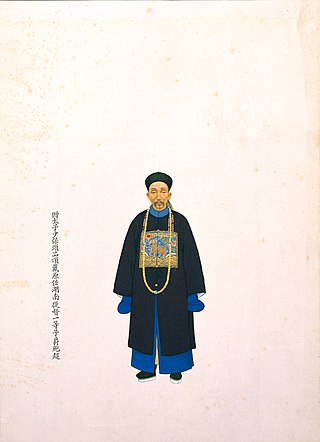
Bao Chao (1828–1886) was an eminent Han Chinese official, military Captain General, of the late Qing Dynasty in China. He raised the Xiang Army to fight effectively against the Taiping Rebellion and restored the stability of Qing Dynasty along with other prominent figures, including Zuo Zongtang and Zeng Guofan, setting the scene for the era later to fight against known as the "Nien Rebellion". He was known for his military perception.
Imperial Commissioner was a high-ranking government official or military general commissioned by the emperor of China during the late Ming (1368–1644) and Qing (1636–1912) dynasties. His power was just below that of the emperor, such that he could command viceroys and provincial governors by imperial edict.

Song Qing (1820–1902), courtesy name Zhusan, was a Chinese general who served the Imperial government during the First Sino-Japanese War and in the Boxer Rebellion.

The General of Ili, also known in western sources as the Kuldya Military Governor, was a position created during the reign of the Qing Qianlong Emperor to "pacify" Dzungaria and suppress uprisings by the Khoja "Rebels". The General of Ili governed the entire Xinjiang during Qing rule until it was turned into a province.

Hu Linyi (Chinese: 胡林翼; Wade–Giles: Hu2 Lin3-i1; July 14, 1812 - Sept 30, 1861) was a scholar and official during the late Qing Dynasty in China. He rose to prominence after being awarded the jinshi degree in the Imperial Civil Service Examinations in 1836, and in 1838 became a compiler of the Hanlin Academy in Beijing. After serving in several prefectural appointments in Guizhou, Hu was appointed the Governor of Hubei province in 1855. In that capacity, he merged multiple local militia groups to form a resistance force, the Hubei Army, to combat the Taiping Rebellion. He coordinated military efforts alongside other provincial leaders, such as Zeng Guofan and Zuo Zongtang. By 1857, Hu's Hubei Army was successful in recapturing Wuchang and much of Hubei from the Taiping. Deeply overworked by the campaign against the Taiping, however, Hu died in 1861 before the war's conclusion.
The Qing reconquest of Xinjiang was the event when the Qing dynasty reconquered Xinjiang after the Dungan Revolt in the late 19th century. After a century of Qing rule, the Uzbek adventurer Yakub Beg conquered almost all of Xinjiang during the revolt, but was eventually defeated by the Qing General Zuo Zongtang. Furthermore, Qing China recovered the Gulja region through diplomatic negotiations with the Russian Empire and the Treaty of Saint Petersburg in 1881. Xinjiang was converted into a province in 1884.
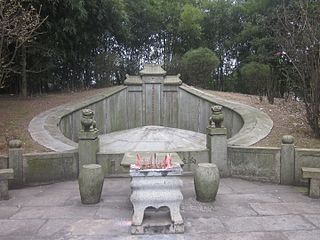
The Tomb of Zuo Zongtang is the tomb of Zuo Zongtang, a Chinese statesman and military leader of the late Qing dynasty. The tomb dates from 1886, and is located in Tiaoma Town of Yuhua District, Changsha, Hunan, China. It has been categorized as a provincial level key cultural heritage in 1996 by the Hunan Provincial Government.

Tan Zhonglin was a Qing dynasty scholar-official. He was born in Gaolong, Chaling County, Hunan Province. His courtesy name was Wenqing (文卿). He was the father of Tan Yankai, a politician of the Republic of China.
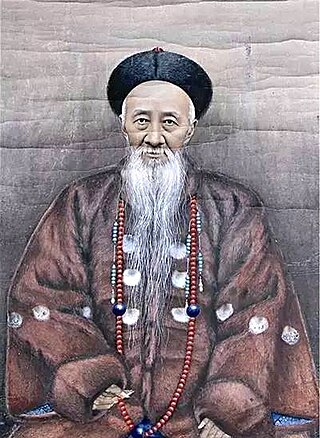
Wang Debang, courtesy name Langqing was a Chinese general of the Hunan Army during the late Qing Dynasty who was most notable for his service in the Sino-French War.
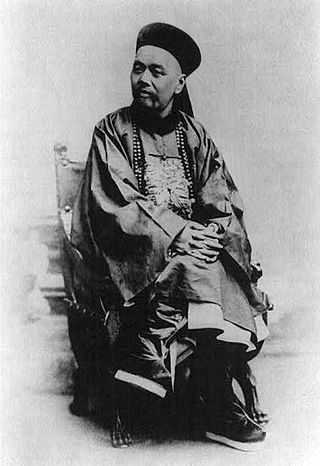
Zhang Yinhuan, courtesy names Haoluan and Qiaoye, was the third Chinese Ambassador to the United States during the Qing dynasty.


















